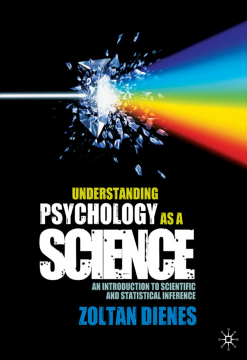
Additional Information
Book Details
Abstract
What makes psychology a science?
What is the logic underlying psychological research?
In this groundbreaking book Zoltán Dienes introduces students to key issues in the philosophy of science and statistics that have a direct and vital bearing on the practice of research in psychology. The book is organised around the influential thinkers and conceptual debates which pervade psychological research and teaching but until now have not been made accessible to students. In a clear and fluid style, Dienes takes the reader on a compelling tour of the ideas of:
- Popper
- Kuhn& Lakatos
- Neyman& Pearson
- Bayes
- Fisher& Royall
Featuring examples drawn from extensive teaching experience to ground the ideas firmly in psychological science, the book is an ideal companion to courses and modules in psychological research methods and also to those covering conceptual and historical issues.
ZOLTAN DIENES is a Reader in Experimental Psychology at the University of Sussex, where he has lectured since 1990. His main research area is learning and he has written 65 publications. He teaches a core course on philosophy of psychology to all final year psychology undergraduates.
'The way in which Dienes presents the conceptual debates and psychological principles in succinct, brief and coherent pieces allows the information to be digested in a simple manner; and the cartoon-style portraits of Popper and Kuhn among others offer a reinvention of the usual style in which thinkers are portrayed to students...the complex issues of philosophical principles, scientific inference, statistical testing and argument are presented in a clear and accessible manner. The book excels in providing the reader with a substantial understanding of how theories emerge and are tested. Furthermore, the nature in which Dienes examines the logic, assumptions and inferences of the most frequently used statistical tests allows us as researchers to ensure we are employing the most rigorous of approaches within our research. This is an exceptional overview of the scientific principles that underpin the discipline, and should be welcomed by teacher, researcher and undergraduate psychology student alike.' - Helen Henshaw, The Psychologist
'An engaging and provocative exploration of scientific inference in psychological science - one that lays bare the conceptual underpinnings of our ways of thinking about these matters and forces us to confront alternative perspectives. Everyone who wishes to be clear about how well any scientific position is supported by data will want to be sure they understand the ideas presented in this book. Highly recommended for students and professionals alike.' - Professor James L. McClelland, Stanford University, USA
'Students should have - and perhaps need to have - a deeper understanding of how theories are tested and evolve. Likewise, most researchers would be well served by a deeper understanding of the logic, assumptions, and implications of our commonly used statistical procedures. Dienes' book speaks well to needs, providing a sophisticated and clear tour of the conceptual and philosophical foundations of psychological research. I enjoyed the book and will surely be influenced by it in my teaching.' - Professor Daniel Reisberg, Reed MA26, USA
'An engrossing read. Dienes relates statistical controversies to general issues in the philosophy of science, and in so doing puts common misconceptions right. The book is full of advice that makes the difference between a mediocre and expert researcher. Despite some difficult passages I was drawn into the story; imagine that when reading about statistics - remarkable! In sum: A very useful correction to our typical methods courses for advanced undergraduates, graduates, and even many established researchers.' - Professor Josef Perner, University of Salzburg, Austria
'I can thoroughly recommend this book. Dienes makes topics that are often dull interesting, covers positions he does not favour fairly and comprehensively, and describes all the important issues succinctly. In short, a really nice, brief, but comprehensive account of the important issues underlying psychology understanding.' - Dr. Roland Baddeley, University of Bristol, UK
'Quite remarkable. A textbook on issues in psychological research methods that actually explains how science works, why it has the exciting texture it does and what philosophical principles underlie it. It will change the way research methods are taught.' - Arthur Reber, Broeklundian Professor, Emeritus, CUNY, USA
'This book presents psychology students with a careful line of argument, and is in itself an excellent example of how to write. It provides an authoritative and lucid treatment of the scientific nature of psychology that will appeal to undergraduates and anyone else interested in the tussle between science and irrationality.' - Morag Maclean, Oxford Brookes University, UK
'Dienes' enthusiasm for his subject matter shines through the text. The desire to do good science, and to avoid poor inferences, is infectious. This is the only book that aims to teach psychology undergraduates alternative ways statistics can be done...' - Psychology, Learning& Teaching
Table of Contents
| Section Title | Page | Action | Price |
|---|---|---|---|
| Cover\r | Cover | ||
| Half-Title\r | i | ||
| Title\r | iii | ||
| Copyright\r | iv | ||
| Dedication\r | v | ||
| Contents | vii | ||
| Preface | viii | ||
| 1 Karl Popper and demarcation | 1 | ||
| 2 Kuhn and Lakatos: paradigmsand programmes | 33 | ||
| 3 Neyman, Pearson andhypothesis testing | 55 | ||
| 4 Bayes and the probability ofhypotheses | 82 | ||
| 5 Fisher and the likelihood:the Royall road to evidence | 121 | ||
| References | 157 | ||
| Glossary | 162 | ||
| Index | 168 |
